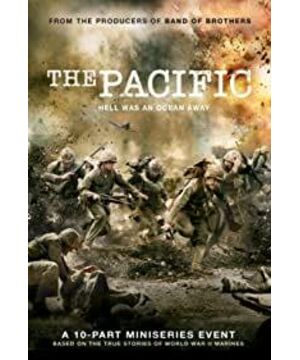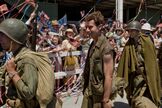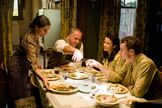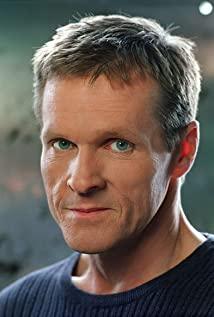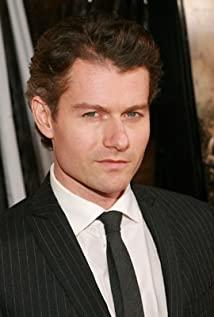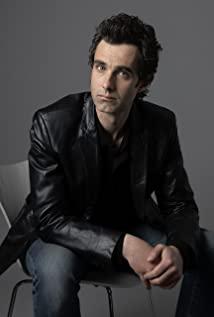On May 16, the HBO annual drama "Wind and Rain" came to an end. On the whole, it is indeed inferior to the "Brothers" that once made our hearts excited. However, at the end of the episode, pictures of actors and prototype characters appeared one after another. We can see that everyone’s fate is due to this war. And change. Some of them became university professors, some became ordinary workers, some remained unmarried after their husbands died, and some left the shadow of war forever. They would often wake up and cry at night... "Who has ever seen him like this? The experience? Let him go.” This is the end of "Wind and Rain in the Pacific", what Eugene's father said to his mother, and it is also the last line of the play. When the music sounded, Eugene had been sitting under the tree, looking lonely, dazed, and thoughtful. This reminds me of the ending of "Brothers". The last line of the series is like this: "The war is over. Regardless of the points, medals or scars, every 101st airborne brother will go home. Every one of us will because of this. Experience together and be connected forever. Everyone must try their best to rejoin the world.” Those real archetypes said at the end of the series: “One day my grandson asked me a question, and he asked me:'Grandpa, you are in the war The hero?’ I replied: No, but I have served with the heroes.” One is infinitely sad, the other is hopeful; the other is trying to forget, and the other is proud to tell the children and grandchildren. Therefore, "Wind and Rain" is not a sibling of "Brothers", it is just an alternative version of the war drama. Although it is not very exciting and lacks many, it is still worth remembering and reminiscing. There will be an impulse and passion to watch "Brothers" again, but "Wind and Rain" is just like the boring, cruel, and crazy war described in it. Even though there are many moments that impress me, I never think about it anymore. Relive this play, do not want to enter this chaotic world again.
The general comment
I said last time, "Brothers" is similar to a series of stories composed of ten films, and "Wind and Rain" is more like a big movie composed of ten parts. Therefore, the level of each episode of the former is very average, and there is no big ups and downs. Any episodes are all required and all-tailed, and the structure is clear, and they can be separated into chapters.
The ten episodes of "Wind and Rain" seem to be uneven. The first three and four episodes are not clear enough. It is the Battle of Guadaltanal, and the appearance of several protagonists makes it difficult to impress. It wasn't until the five six seven three episodes were written on Peleliu Island that the relationship between the episodes began to smooth out, the three protagonists slowly formed, and the main supporting roles were also remembered. I personally think that the eighth and tenth episodes are the best two episodes of the whole series. The former is almost a small biopic by John Baslon. The civil and martial arts are properly matched, and the interspersed love story is wonderful, compact and touching. The beach A scene is a rare stretch, relaxing, and sweet in the series. For no reason, it reminds me of the famous beach kiss in "Troubled Souls"-the latter highlights the sexiness, and the affectionate styles in this play are not glamorous. Both episodes have basically reached the average level of "Brothers", which is worth remembering. Especially in the tenth episode, going home is quite different from the ending of "Brothers", the aftermath is even longer: Merriell Shelton picks up his backpack and prepares to get off the train, he finally glances at the sleeping Eugene Sledge, and leaves silently. The immense poetry of "silence is better than sound at this time" contained in this scene somehow made me feel infinitely moved.
By the way, I think it’s better to translate this drama into "Wind and Rainy Pacific", "Pacific War" seems very rigid, and the drama actually does not show the situation of the Pacific battlefield in all directions, only the point where the Marines captured the islands. Ernest King or Nan Yun Zhongyi were left alone, and Du Li De was not seen. Of course, the translation of "Blood in the Pacific" is also good.
create character
The series portrays three characters: Robert Leckie, Eugene B. Sledge and John Basilone. Robert Lacky has a literary temperament and unruly style; Eugene Sledge has quickly experienced the process from innocence to anger and loss; John Baslon is a typical Italian descent, full of enthusiasm, courageous and enterprising. action. Among the three characters, John Baslon is the one that is easy to portray. It does not require too many complicated events to bring the characters to life. But this character is not cheesy, and is essentially a high-level hero. Robert Lay can basically be more brilliant, but the series portrays him too neurotic, and his inner exploration is not enough, which seems a bit inexplicable. Lekki’s most exciting scene is at the end of the gathering. When he returned to his hometown, he met his favorite girl, Vera. The dialogue between the two on the date was amazing: Vera asked him why he didn’t send her the letter, Leki Said: "I thought it didn't last long anyway, and it didn't make any difference whether to post it or not." Vera continued to ask what he wrote in the letter, and Lacky said emotionally: "The most beautiful phrase in this life." The phrase is ancient Chinese. In terms of comment, it can be called "With this sentence, the realm is all out."
Even though Eugene Sledge played late, he was the one with the fullest personality shaping. The last few episodes of the series are all around him, full of showing how a good young man almost lost his mind in the harsh war and was immersed in the killing. The most noteworthy scene is in the episode of Iwo Jima. Eugene ran into a thatched house and saw a dying woman who was speechless. After experiencing multiple civilian human flesh bombs, Eugene pointed the gun at her vigilantly, but she tried to put the gun against her forehead. Eugene struggled with two emotions of anger and pity, and finally put down the gun and carried the woman out of the hut. A puppet held in the woman's hand fell to the ground-not long ago, he had called a mortar to destroy it. House. Don't you think this scene is so familiar? In Kubrick's business card "Full Metal Shell", a thin Vietnamese girl used a sniper rifle to crush a group of people so that they could not lift their heads. When the American soldiers finally rushed into the ruins, they found the seriously injured and fallen to the ground. When she was, she could only look at these enemies pitifully, faintly shouting "Kill me, kill me..." The American soldiers who had lost their comrades said angrily, "Leave her alone, let her die in pain." But in the end she was kind. The surviving "Joker" still gave her a bullet. After all, war is not a massacre. Before he joined the war, Eugene's father was worried that the war would destroy his spirit and poison his pure heart, so that he would never be able to return to normal. This is indeed possible. Snafu, the supporting actor in the show, is based on this kind of person: This guy is not as thick as the TV show, but is a short man with a short stature. He lived in Louis Anna after the war. He became an air-conditioning repairer after he was discharged from the army. He had two children, one of whom died later. Snafu hated the Japanese all his life. It is said that at a veteran gathering, a Japanese Toyota drove in front of the veterans. The old Snafu suddenly jumped up, picked up a stone from the ground and threw it at the Toyota. How come there are small Japanese cars everywhere! These survivors are often shaped like solidified volcanoes by the war.
Regrettably, the overall characterization of the play seems to be unsuccessful. Unlike in "Brothers", even the supporting roles can be remembered clearly. The three protagonists are not as clear-cut as Major Winters, they are always a little thin and one-sided.
theme
In the expression of the theme, "Wind and Rain in the Pacific" and "Brothers" are also quite different. "Brotherhood" focuses on showing brotherhood in war. Although it also involves anti-war and reflection on human nature in war, it is more about defeating the Nazis and defending the belief in justice and humanity. The tone of the whole drama is clear and upward. . On the European battlefield, the U.S. forces against the German forces, but both are countries in the Christian cultural circle. Their cultures are of the same origin and the degree of development is similar. Therefore, the entire war is still conducted under the consensus of many civilizations (for example, compliance with the Geneva Conventions). Prisoners of War Regulations in China, distinguishing between soldiers and civilians, etc.). The most shocking scene is only the episode of the concentration camp-this is because Hitler has long stopped treating Jews as human beings. "Brothers" also specifically described the killing of German prisoners of war, and its condemnation was also very obvious.
All this was completely different in the Pacific War. American President Franklin Roosevelt once said: "The Japanese are the most despicable and shameless people I have ever seen." The movie "Tiger! Tiger! Tiger! In ", there is a very clear expression of how the Japanese ignore international law and play conspiracies without faith. Therefore, the cruelty and meaninglessness of the war is particularly strong and in-depth in "Wind and Rain in the Pacific"-the Japanese suicide attacks on the Pacific battlefield, the use of civilians to attack the U.S. military, and the stubborn resistance to never surrender, etc. are what the United States does. It is difficult to understand fighters trained in democracies. If there was a breath of European chivalry in World War I, then World War II broke all the illusions about the development of civilization in the European and American world. Therefore, the director of this play will even devote an episode specifically to describe the problem of a warrior's mental breakdown.
The essence of the US military, the Marine Corps, is almost all volunteers. In the last few episodes, several veterans sarcastically sneered at a rookie conscript. They are fighting for the principles and ideals in their hearts. However, the cruelty of the war and the irrationality and inhumanity of the Japanese army greatly affected the spirit of these soldiers. Eugene, who was once so idealistic and so young, would take out a pistol in the war, calmly and even cruelly knocked down the Japanese army. When his commander told him that as a soldier in the mortar squad, you should only be responsible for observing, rather than taking the initiative to shoot the enemy, Eugene was excited and even frantically said for the first time: Anyway, it is to kill devils, how to kill? Is it a difference? When necessary, I will choke them to death with my hands! On the Pacific battlefield, you can't treat the Japanese as a counterpart, a highly civilized human being. If American soldiers want to survive, they can only treat each other as demons and beasts. This is also the source of the so dark, trivial and neurotic of "Wind and Rain", it cannot be as magnificent and magnificent as "Brothers", especially after the original biographers have been trapped in mud, plague and fear for so long.
After the war, Eugene felt a sense of emptiness and exhaustion. Every soldier returning home is asking himself: Why did I survive in the end? Why are those comrades in arms not so lucky? I don't know if the gloomy atmosphere of the whole drama of "Wind and Rainy Pacific" has anything to do with the background of the post 9/11 or economic depression. It's just that although we are analyzing the depth of the theme of the series, having depth does not mean that the level of the series is superb. Too much artistic conception, scattered narratives, and thin characterization are the dead spots of this play. After all, this is an excellent historical war drama, but nothing more. After watching "Wind and Rain in the Pacific", I still look forward to a movie or TV series that can show the ups and downs of the Pacific War more macroscopically!
View more about The Pacific reviews


